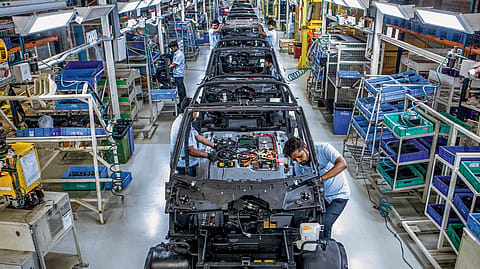Few hits, few misses; here’s what interim budget had in store for EV industry
The budget estimates document shows that the interim budget has provided a capital outlay of ₹3,500 crore under the production-linked incentive (PLI) scheme for automobiles and auto components.

In her 58-minute-long interim budget speech, Union finance minister Nirmala Sitharaman made some key announcements that could further boost the growth of the EV industry in India. The Union minister says that the government will expand and strengthen the electric vehicle ecosystem by supporting manufacturing and charging infrastructure while encouraging the adoption of electric buses in public transport.
Ahead of the interim budget, the electric vehicle industry anticipated various incentive and policy measures that could aid the electrification journey in India. The government has, however, addressed some, while keeping a close lid on others.
Increased incentives
A crucial announcement that has been made in the interim budget, is an increased outlay for semiconductor manufacturing in India. According to the budget estimates, the capital outlay under the modified programme for the development of semiconductors and display manufacturing ecosystem has been increased by a whopping 130.1% to ₹6,903 crore in FY25, as against ₹3,000 crore announced in last year’s budget. Semiconductors are also used by the auto industry. The move holds significance as it will reduce the import of chips and semiconductor components, thus promoting localisation.
Moreover, the budget estimates document shows that the interim budget has provided a capital outlay of ₹3,500 crore under the production-linked incentive (PLI) scheme for automobiles and auto components. The scheme is applicable beginning FY24-25.
“The disbursement of funds under PLI schemes (enhanced budgeted outlays for both Automobiles/components and advanced chemistry cell battery storage) would support cash flows and credit metrics for the Automotive OEMs and ancillaries. With enhanced outlays, the PLI scheme aims at fast-tracking investments in technology and will also increase localisation of auto components, accelerate investments towards a local EV ecosystem,” says Shamsher Dewan, Senior Vice President & Group Head - Corporate Ratings, ICRA Limited.
Notably, capital outlay, as per the budget estimates, for the national green hydrogen mission, has been jacked up to ₹600 crore in FY25, from ₹₹297 crore in the last budget. In order to boost EV charging infrastructure, the union finance minister has announced rooftop solar installations across one crore households.
Recommended Stories
“The government's strong support for the e-vehicle ecosystem, including manufacturing, charging infrastructure, and incentivizing e-bus adoption, is likely to bring about important changes in our industry. Additionally, the introduction of secure payment mechanisms for e-buses addresses a crucial obstacle to public acceptance,” says Niranjan Nayak, MD, Delta Electronics.
Meanwhile, in order to boost green mobility, Sitharaman announced phased mandatory blending of compressed biogas (CBG) in compressed natural gas (CNG) for transport and piped natural gas (PNG) for domestic purposes.
“The government has allocated significant resources to strengthen the green energy sector towards realising nation's ambitious Net Zero target by 2070. Financial support for biomanufacturing and biofoundry will stimulate green growth and modern innovations playing a pivotal role in fostering a circular economy that benefits agricultural income. The measures towards expansion and strengthening of the EV ecosystem to support manufacturing and charging infrastructure will act as a catalyst for an era that will encourage alternate, cleaner and efficient powertrains on roads,” says Swapnesh R Maru, Deputy Managing Director – Corporate Planning, Finance & Administration and Manufacturing, Toyota Kirloskar Motors.
According to Sudarshan Venu, MD, TVS Motors, “the continued infrastructure spending with the push to develop the EV ecosystem is exactly what the industry needs.”
(INR CR)
Analysts observe that a push towards manufacturing and charging infrastructure will further drive growth in India. “Lack of charging Infrastructure has been perceived by many consumers who intend to buy EVs as a major hindrance. And hence focused steps to improve the charging infrastructure will aid in driving consumption,” says Rajeev Singh, Partner and Consumer Industry leader, Deloitte Asia Pacific.
No reduction of import duty, GST on EV components
While the union minister laid emphasis on the local manufacturing of electric vehicles, the import duty has not been reduced for EV components has not been reduced. This was one of the industry's key proposals, ahead of the interim budget. At present, lithium-ion batteries and EV components attract a GST (goods and services tax) of 18%. The industry recommended a reduction of GST to 5%. But no announcement regarding this has been made in the interim budget.
Moreover, luxury automakers had proposed a reduction of import duties on electric vehicles. The finance minister has, however, kept the import duties unchanged.